
Pressure is mounting for Israel to release many more detainees as part of the U.S.-backed Gaza ceasefire deal, including Dr. Hussam Abu Safiya, director of Gaza’s Kamal Adwan Hospital, who has been held under harsh conditions without charge since December, when Israeli troops stormed the hospital — claiming without evidence it was a Hamas command center. Soldiers forced Dr. Abu Safiya out at gunpoint along with patients he had refused to abandon. Famous footage shows him wearing his white medical coat as he climbed over rubble to walk toward an Israeli tank before he was detained.
Naji Abbas, director of the Prisoners Department at Physicians for Human Rights Israel, says that Abu Safiya is one of at least 19 doctors held in Israeli detention without charge. “They are facing a very serious risk for their health and for their lives,” says Abbas. “They are being tortured. They are facing violence daily.”
Transcript
AMY GOODMAN: I’m Amy Goodman. This is Democracy Now!, joined by Democracy Now!'s Juan González. It's The War and Peace Report.
On Monday, thousands of Palestinians gathered in Khan Younis and the West Bank to celebrate the return of nearly 2,000 Palestinian prisoners freed as part of the ceasefire deal. Many were jailed by Israel without charge or trial, showing signs of starvation, medical neglect and torture.
Now there’s mounting international pressure for Israel to release more Palestinians, including the pediatrician Dr. Hussam Abu Safiya, director of Gaza’s Kamal Adwan Hospital. He’s been held under harsh conditions without charge since December, when Israeli troops stormed his hospital, claiming without evidence he was a Hamas command — that it was a Hamas command center. Soldiers forced Dr. Abu Safiya out at gunpoint along with patients he had refused to abandon. There’s famous footage showing him wearing his white medical coat as he climbed over the rubble to walk toward an Israeli tank before he was detained. Dr. Safiya had continued his work even after an Israeli attack killed his son. He also suffered injuries.
This is a Palestinian prisoner freed earlier in the year, named Hakim, describing what Dr. Abu Safiya had been exposed to in Israeli detention.
HAKIM: [translated] Dr. Hussam was beaten, especially Dr. Hussam and us, the medical staff, out of all other captives. They beat us, cursed at us and starved us. And they started punching him. “Are you the doctor? Come here.” And they’d beat him.
AMY GOODMAN: Calls are also growing for Israel to release Dr. Marwan al-Hams, the director of field hospitals in Gaza.
For more, we go to the occupied West Bank, to Ramallah, where we’re joined by Naji Abbas, director of the Prisoners Department at Physicians for Human Rights Israel, which in February released the report, “Unlawfully Detained, Tortured, and Starved: The Plight of Gaza’s Medical Workers in Israeli Custody.”
Welcome back to Democracy Now!, Naji. Why don’t we start off with Dr. Abu Safiya? And then just talk about how many doctors, nurses, hospital staff are detained in Israeli jails.
NAJI ABBAS: Good morning, Amy.
As you mentioned, in your words, Dr. Abu Safiya is still detained, unfortunately. Him and beside him, we know about 19 doctors who are still in detention and weren’t released yesterday, and also about dozens of nurses and paramedics who didn’t get released yesterday. Why? We don’t know yet. But they are still in detention without being — again, without being charged officially with any offense.
JUAN GONZÁLEZ: And what about the plans now for rebuilding the healthcare system in Gaza? What do you think are the immediate first steps that need to be taken?
NAJI ABBAS: As we said from the beginning, the arrest and the detention of the healthcare workers, one of its goals for the Israeli army was destroying the health system in Gaza. The health system in Gaza now need every source that can help to rebuild these facilities, to help to rebuild the staff. And keeping these doctors, these nurses in detention is denying from the opportunity to rebuild this system.
JUAN GONZÁLEZ: And the people who are being released now, many of them have lost — have severe weight loss and are — basically, were almost starved while they were in captivity. What do we know about the deliberate withholding of food and water from Palestinian detainees?
NAJI ABBAS: That’s it. We visited Dr. Abu Safiya a month ago. On the 25th of September, our lawyer, lawyer of PHRI, met him for the first time, actually, in Ofer Prison. Dr. Abu Safiya complained about being starved, about violence, daily violence in Ofer Prison. He witnessed and described that he’s suffering from medical issues and medical problems, and he’s not getting any follow-up. He didn’t meet a doctor for months. Actually, Dr. Abu Safiya described that he — in the day of the visit, it was the first time that he received clean clothes. After nine months in Israeli detention, it was the first time, before our visit, that he got clean clothes.
So, we need to emphasize we are not calling for the release of these healthcare workers just because they — first of all, because they are unlawfully detained. They are not being charged. But second of all, because every one of them, the ones who suffer from health conditions, but even those who are healthy before the arrest, they are facing a very serious risk for their health and for their lives. They are being tortured. They are facing violence daily. They are denied from medical care, denied from their basic rights. They are being starved.
They are disconnected totally from the outside world. They don’t know what’s happening, what’s happening with the deal, if they are getting released, if they are not. They don’t know their legal status, actually. They are not getting the opportunity to get consulted from a lawyer. Their courts — they are describing the hearings in the court that continue for two minutes, saying to them, “You will stay in detention. You are not charged officially, but you will stay in detention. We don’t know for how long.” That’s the status. So, that’s why we are calling for their release.
AMY GOODMAN: Najib Abbas, we want to thank you for being with us, director of the Prisoners Department at Physicians for Human Rights Israel.
As President Trump celebrates the ceasefire-hostage deal, major questions remain over what happens next. We’ll look at the Gaza summit, and we hopefully will go to Gaza City, where there’s been internet loss. Stay with us.
[break]
AMY GOODMAN: Billy Bragg performing “Waiting for the Great Leap Forwards” in our Democracy Now! studio.

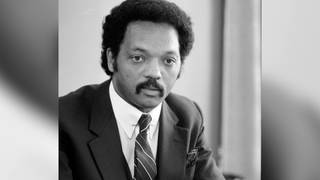

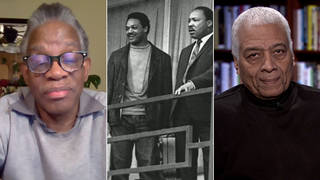
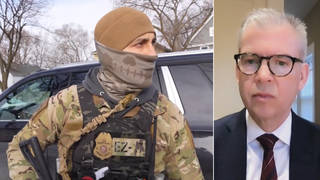





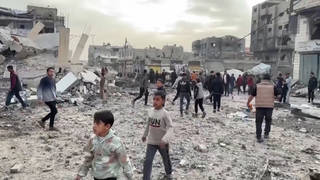

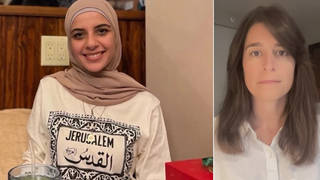
Media Options